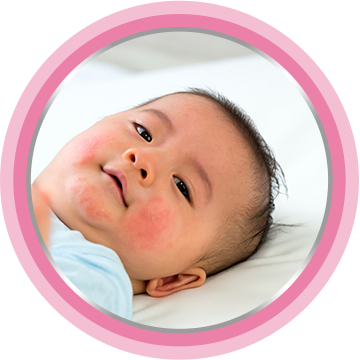Learn about nappy irritation
Babies’ skin is thinner, softer, and much more sensitive than ours. It also has a higher pH level, which makes it more sensitive to irritants. Although unpleasant for you and your baby, nappy area irritation or nappy skin is extremely common and easy to manage with the right care. For example, use proper nappy cream or ointment at every diaper change.
What is nappy irritation? Can a cream or ointment help?
Nappy irritation can occur at any time during your child’s nappy-wearing stage. Most children will experience it during this time, which appears as redness, lesions, swelling or spots on your baby’s bottom, thighs and genitals. Their affected skin may also be hot to touch.

The risk of nappy irritation changes as your baby grows. During the first twelve months, nappy irritation is especially common, as stools are more frequent, and your baby’s skin is thinner, more permeable, and has a higher pH level.
Remember, uncomfy diaper area is incredibly common, but there's a simple way to help to protect your baby's skin by using a barrier nappy ointment. Use a nappy ointment to provides durable and long-lasting protection for your baby's skin at the nappy area.
How does nappy irritation affect your baby?
Your baby’s behaviour might seem more troubled – they may cry when touched or washed and wake frequently in the night because of discomfort.
Causes of nappy irritation
The most common cause of nappy irritation is a combination of soiled nappies and friction. A baby’s delicate skin becomes sore and fragile when in contact with the natural, yet irritating chemicals in healthy urine, and the irritants and enzymes in feces.
This is made worse by a tight nappy, which both rubs, removing the skin’s protective lipids, and stops air from circulating. If left untreated, this can even lead to more severe forms of irritation. Some baby wipes and cleaning products can also cause irritation.
Nappy irritation is more likely to occur if your baby is:
- Premature
- Unwell
- Recovering from vaccination
- Suffering from diarrhea (which may be caused by certain medications, e.g. antibiotics or change in diet)
- Weaning
- Prone to hereditary skin conditions

When should you see the doctor?
If nappy irritation does develop, try not to worry as there are treatments available. If it’s been a few days and in spite of treating the irritation is still spreading outside the nappy area, and if the skin is broken and weeping, or your baby is feverish, there may be an infection. Again these symptoms are common and not necessarily a cause for alarm, but you should consult a doctor.
REFERENCES:
- http://www.bepanthen.de/de/hautprobleme/geroetete-juckende-hautstellen/#tab_1
- http://www.mayoclinic.org/diseases-conditions/eczema/basics/causes/con-20032073
- https://www.bepanthengamme.fr/gamme/bepanthen-sensicalm/
- http://www.mayoclinic.org/diseases-conditions/eczema/basics/symptoms/con-20032073
- https://www.bepanthengamme.fr/gamme/bepanthen-sensicalm/




